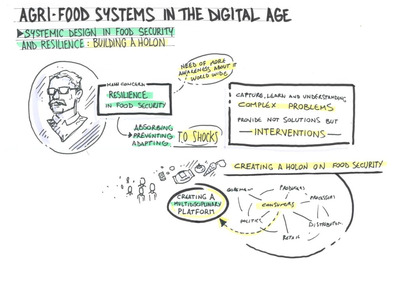Systems thinking in food security research
Lydakis, Apostolos E., Darzentas, John and Darzentas, Jenny S. (2020) Systems thinking in food security research. In: Proceedings of Relating Systems Thinking and Design (RSD9) 2020 Symposium., 9-17 Oct 2020, Ahmedabad, India.
Preview |
Text
Lydakis_Food_RSD9_2020.pdf Available under License Creative Commons Attribution Non-commercial No Derivatives. Download (964kB) | Preview |
Preview |
Text
Lydakis_Food_Slides_2020.pdf Available under License Creative Commons Attribution Non-commercial No Derivatives. Download (1MB) | Preview |
![Lydakis_Food_img_2020.png [thumbnail of Lydakis_Food_img_2020.png]](https://openresearch.ocadu.ca/3693/3.hassmallThumbnailVersion/Lydakis_Food_img_2020.png)  Preview |
Image
Lydakis_Food_img_2020.png Available under License Creative Commons Attribution Non-commercial No Derivatives. Download (460kB) | Preview |
Abstract
Reference to systems thinking is found in food studies more frequently, and the need for design interventions becomes more prominent as food security research increasingly acknowledges the complexity of the problem space. A systems approach allows a better grasp of the complex interconnections and stakeholders involved. However, the existing variety of approaches based on fundamentally different assumptions could lead to misconceptions, if not made explicit.
The purpose of the current literature review is to enhance the mutual understanding of systems thinking by food security and design researchers, investigating the adoption of systems notions, and uncovering their relevant positioning on the systems approaches spectrum. A three-step method was followed: selecting the papers, organizing them in thematic clusters and visualizing the papers’ timeline succession, and mapping the degree of adoption and sociological paradigm of their systemicity. This process allowed for a more holistic perspective and enabled the emergence of significant issues: the increasing need of food security researchers for a combination of quantitative and qualitative approaches; the paradox of disciplinary bias; and the absence of emancipatory approaches. The generated “systemicity map” can serve as a tool for systemic designers to establish a common understanding of systems approaches when working alongside researchers and other stakeholders of food security. Furthermore, considering the map’s topology could help systemic designers locate and prioritize the most “promising” candidates for interdisciplinary collaboration. Finally, the results advocate a pro-innovation bias.
| Item Type: | Conference/Workshop Item (Paper) |
|---|---|
| Divisions: | Faculty of Design |
| Date Deposited: | 09 May 2022 20:34 |
| Last Modified: | 09 May 2022 20:45 |
| URI: | https://openresearch.ocadu.ca/id/eprint/3693 |
Actions (login required)
 |
Edit View |

 Tools
Tools Tools
Tools